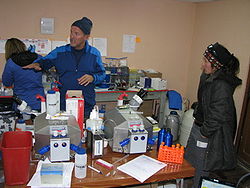Difference between revisions of "Bolivia-Mount Chacaltaya 2012"
From Bioblast
(Created page with "== AltitudeOmics 2012 == right ''"If we can figure out how the body responds to hypoxia there are implications for cancer, heart, lung and blood disea...") |
|||
| Line 1: | Line 1: | ||
== AltitudeOmics 2012 == | == AltitudeOmics 2012 == | ||
[[File:Chacaltaya lab.JPG|right]] | [[File:Chacaltaya lab.JPG|250px|right]] | ||
''"If we can figure out how the body responds to hypoxia there are implications for cancer, heart, lung and blood disease. It could have enormous reach."'' - Robert Roach, Director of the Altitude Research Center, School of Medicine, University of Colorado, USA | ''"If we can figure out how the body responds to hypoxia there are implications for cancer, heart, lung and blood disease. It could have enormous reach."'' - Robert Roach, Director of the Altitude Research Center, School of Medicine, University of Colorado, USA | ||
Revision as of 13:18, 18 May 2015
AltitudeOmics 2012
"If we can figure out how the body responds to hypoxia there are implications for cancer, heart, lung and blood disease. It could have enormous reach." - Robert Roach, Director of the Altitude Research Center, School of Medicine, University of Colorado, USA
MitoCom Tyrol participated in the AltitudeOmics 2012 project - scientists were using high-resolution respirometry to study mitochondrial function at 5,240 m in Bolivia, Mt. Chacaltaya.
